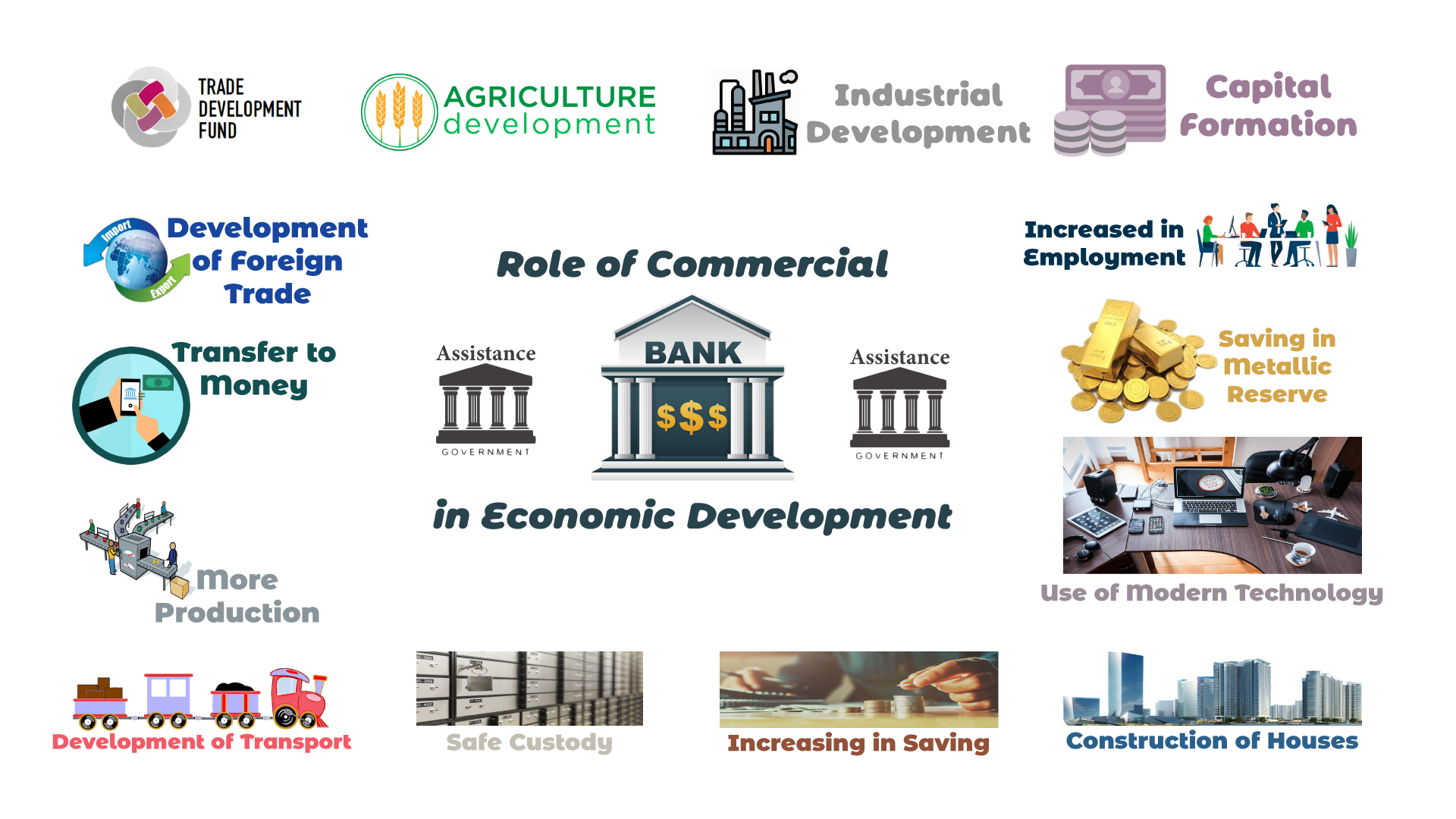The banking sector has one of the pillars of economic prosperity for many centuries. In fact, history provides some basic information about how the banks in our newly acquired colonies financed imperialist enterprises. Overtime banks have formed an important part in providing an avenue for both savings and investment. Land, labor, capital, and entrepreneurs are the primary economic resources available for business. However, to use these resources a business needs money to purchase land, hire labor, pay for capital goods, and pay for individuals with skilled people. In the rest of the article, we are going to know the Role of Commercial Banks in Rural Economic Development.
Role of Commercial Banks in Economic Development:
The Detail Role of Commercial Banks in Economic Development is given below:
- Trade Development: Commercial banks provide capital, technical assistance, and other facilities to traders as per their need which leads to growth in trade.
- Agriculture Development: Commercial banks finance the most crucial sectors of the developing economy, such as agriculture, short, medium, and long-term loans for seeds and fertilizers, tube wells installation, warehouse construction, purchase of tractors and threshers.
- Industrial Development: Countries that have focused on the industrial sectors have developed rapidly. South Korea, Malaysia, Taiwan, Hong Kong, and Indonesia have recently developed their industrial sectors with the help of commercial banks.
- Capital Formation: Commercial banks help to increase the rate of capital formation in a country. Capital formation means increasing the number of production units, technologies, plants, and equipment. They fund projects responsible for increasing the rate of capital formation.
- Development of Foreign Trade: Commercial banks assist businessmen in conducting business in two different countries. Credit certificates are issued by the importer’s bank to the exporters to ensure payment. Banks also provide foreign exchange.
- Transfer to money: Commercial banks make it possible to transfer funds from one place to another which leads to the growth of trade.
- More production: A good banking system ensures greater productivity in all areas of the economy. It increases the productive capacity of the economy by strengthening the capital structure and the division of labor.
- Development of Transport: Commercial banks finance the transport sector. This has reduced unemployment on the one hand and increased transport facilities on the other. Remote areas are connected to major markets through improved transportation systems.
- Safe Custody: Business concerns and individuals can relieve themselves of stress by depositing their surplus money in banks. Banks also provide locker facilities to keep their valuable articles and necessary documents safe.
- Increasing in Saving: Commercial banks persuade people to save more. For this purpose, various savings schemes with attractive interest rates have been introduced. Now-these-days the bank has branches in urban and rural areas.
- Construction of Houses: Commercial banks offer credit to their customers for buying or building a home.
- The assistance of the Government: Commercial banks share the funds to the government for creating economic stability and also provide funds for development programs.
- Increased in Employment: The economic prosperity of a country depends on the development of trade, commerce, industry, agriculture, transport, and communication. These sectors are financed by commercial banks and employment opportunities are increasing.
- Saving in Metallic Reserve: Checks and drafts work like money. Thus reducing the need for precious metals for coinage and other important preservation of other metals can be used.
- Credit Creation: Commercial banks are called credit factories. They go much further than collections from people in the form of deposits. Through the process of creating credit, commercial banks provide money to all sectors of the economy, so that they are more advanced than before.
- Proper use of Money: People deposit their savings in banks, so the scattered money becomes a vast amount along the way, which can be used in the right way for various projects.
- Financial Advice: Commercial banks provide useful financial advice to their customers in addition to financial benefits in business development.
- Increased in Investment: Commercial banks raise public savings. They make them available to farmers, traders, and industrialists for the development of agriculture, trade, and industry.
- The success of Money Policy: Under the observation of the Central Bank, all scheduled commercial banks strive for success and achievement in monetary policy. This combined effort of commercial banks makes economic development possible.
- Use of Modern Technology: The use of modern technology in the least developed countries is only possible in the presence of advanced commercial banking as it can be the main source of their funds. These funds are used to import modern technology from developed countries.
- Export Promotion Cells: To boost the country’s exports, banks have set up export promotion centers to provide information and guidance to exporters.
- Economic Prosperity: The economic prosperity of a country depends on various factors including the development of commercial banking. A sound banking system promotes people’s economic position by providing short, medium, and long term loans.
- Training Center: Commercial banks established a lot of commercial training centers for their employees to update the banking system of a country. Thus banking experts enhance their capabilities and contribute to the development of the country.

Library Lecturer at Nurul Amin Degree College










